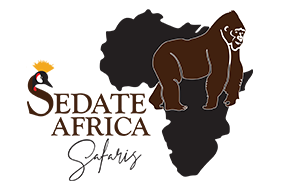
Uganda Birdwatching Tours| Hot springs visits | Hiking in Uganda
Semuliki Forest Reserve was created in 1932 and upgraded to national park status in 1993. This 220km² park lies on the floor of the Albertine Rift Valley just 670-760m above sea level. The 700m descent from Fort Portal town to Semuliki is one of the most scenic drives in Uganda. The only tract of true lowland tropical forest in East Africa, Semuliki represents the eastern limit of the Congo’s Ituri Forest and contains numerous Congo-Guinea species at the eastern limit of their ranges. The park’s 441 recorded bird species, including 35 found nowhere else in East Africa, 15 primate, 300 butterfly and 235 moth species make Semuliki an essential destination for serious naturalists.
The Semliki Valley is the 160km-long part of the Albertine Rift Valley between lakes Edward and Albert, on the remote, western side of the Rwenzori Mountains. The valley, which is shared between Uganda and the Dem. Rep. Congo, contains wildlife from both Central and East Africa. The Ugandan section contains two wildlife protected areas; the forested Semuliki National Park, which has a close affinity with the jungles of the Congo basin, and Toro Semuliki Wildlife Reserve which contains classic East African savanna.
Semuliki National Park
Semuliki National Park boasts a remarkably rich biodiversity. This is partly because its forest cover is extremely old, this being one a few patches of refugia that predate, and persisted through, the arid millennia of the last Ice Age, 12-18,000 years ago. Secondly, it represents the eastern limit of the vast jungles of the Congo and species from Congo-Guinea and East African biomes are both found here. If Semuliki’s species lists have been accumulating for over 25,000 years, the park contains evidence of even older processes: hot springs bubble up from the depths to demonstrate the powerful subterranean forces that have been shaping the rift valley during the last 14 million years.
Wildlife
Semuliki National Park’s location within the Albertine Rift ecosystem at the junction of continental climatic and ecological zones has resulted in a high diversity of plant and animal species. Many of the park’s plant and animal species are inhabitants of the Congo forests and exist at the eastern limit of their range in Semuliki. The park contains 53 mammal species, including an impressive 11 primates, all of which have been found within 6km of Sempaya. Five species of large mammals and 7 species of small mammals have not been recorded in other Ugandan parks while several others, including Dent’s mona monkey, the Central African red colobus, forest buffalo and the water chevrotain, occur nowhere else in East Africa. Of the 1047 birds recorded in Uganda, 435 bird species (43%) are found in Semuliki National Park. These include Albertine Rift Endemics such as the dwarf honey guide and purple-breasted sunbirds; 35 Congo-Guinea biome species found nowhere else in East Africa, including black dwarf hornbill, Nkulengu rail, Congo serpent eagle, Gabon woodpecker; and other species with very limited ranges such as white-tailed hornbill, capuchin babbler, blueheaded crested flycatcher and the orange weaver.
Local People
Four distinct ethnic groups live near the park. Bakonzo cultivate the slopes of the nearby Rwenzori Mountain; Bwamba farmers live along the base of the range; Batuku pastoralists graze their cattle on the open plains beside the Semuliki River; and Batwa Pygmies, traditionally hunter-gathers, live on the edge of the forest.
Access
Roads
Two major roads lead from Kampala to Fort Portal town, which is 60km from Semuliki. Kampala – Fort Portal via Mubende is 290kms (4-5 hours) Kampala – Fort Portal via Mbarara and Kasese is 465kms (7-8 hrs). This route however offers worthwhile diversions to Lake Mburo National Park, Queen Elizabeth National Park and Rwenzori Mountains National Park. Follow the Bwamba Road out of Fort Portal towards the Rwenzori Mountains. The 60km drive (1 hour) drive to the park’s tourism office at Sempaya follows an excellent new tarmac road with dramatic Rwenzori and rift valley scenery. Visitors might consider leaving their vehicle at Itojo for a 3 hour walk to Sempaya on the ‘old Bwamba Road.’ This crosses the north Rwenzori ridge which affords spectacular rift valley views.
By Air
Chartered flights can land at an airstrip on Toro Semliki Wildlife Reserve
Climate
Semuliki receives an average annual rainfall of 1,250mm concentrated during March – May and September – December. Annual mean temperatures range from 180C minimum to 300C maximum, with relatively small daily variation.
When to Visit
The park can be visited at any time, but be prepared for afternoon rain during the wet months.
Birding
The alluring bird list with Albertine Rift endemics, ‘Semliki specials’ and other ‘restricted range’ specials, makes Semuliki an essential destination for serious birders. The 6km public road between Sempaya and Ntandi provides clear views into the forest canopy. The 14km Kirumia Trail, which runs through the heart of the forest to the Semuliki River provides the chance to check off plenty of ‘specials.’ Though day walks are possible, this trail is most rewarding as an overnight camping trip.
Hot Springs
Semuliki’s most famous attraction is the pair of hot springs – ‘male’ and ‘female’ – found near the park office at Sempaya. The female spring, Nyansimbi, which means ‘the female ancestors’, is a boiling geyser that spurts bubbling water and steam up to two metres high. Visitors can buy eggs locally to cook in boiling pools that surround the central spout. Nyansimbi is reached by a short, 15-minute walk through palm forest from the Sempaya park office. The male spring, known as Bintente, is an hour’s walk distant, along a forest trail and swamp boardwalk. A broad, steaming pool 12m in diameter, this is found in a large, swampy clearing enclosed by forest and with a striking Rwenzori backdrop.
Nature Walks
A number of short trails around Sempaya cater for nature lovers and birders. Nature and birding walks are available, as well as night hikes into the forest to seek nocturnal primates.
Toro-Semuliki Wildlife Reserve
Uganda’s oldest game reserve, the 545km2 Toro Semuliki Wildlife Reserve, lies 20km east of Semuliki National Park. The reserve occupies an extensive plain on the rift valley floor, which, incised by steep, riverine gorges, extends north to the marshy shores of Lake Albert and east onto the steep Kijura Escarpment. This distinctive geography supports a diversity of wildlife that includes Central African forest mammals, key East African species and a variety of birdlife. The reserve is home to around 400 bird species while adjacent wetlands on the shore of Lake Albert provide a habitat for the endangered shoebill.
Access
To reach Toro-Semuliki, follow the surfaced Bundibugyo Road towards Semuliki National Park for 27km before turning right at Karagutu trading centre. This dirt road, which runs for 40km to Ntoroko, passes the reserve headquarters after 1.5km and passes the turning for Semuliki Safari Lodge after 25km.
Accommodation
The Semuliki Safari Lodge caters for the luxury market while the Ntoroko Game Lodge offers mid-range accommodation beside Lake Albert. Budget facilities are provided by the UWA bandas and campsite at Ntoroko.
Attractions & Activities
Activities are coordinated from Semuliki Safari Lodge in the heart of the reserve, midway between Karagutu and Ntoroko. Lake Albert boat trips can be arranged at the UWA office in Ntoroko.
Game Drives
Three game tracks explore the grasslands of Toro Semuliki around Semuliki Safari Lodge. Smaller forest and larger savannah elephants are regularly seen along with buffalo, waterbuck, crocodile, warthog and Uganda kob. With luck you may see lion, leopard, pygmy hippopotami and bush babies.
Primate/Forest Walks
The 4-6 hour guided nature walks through the Mugiri River Forest provides the opportunity to find habituated chimpanzees and other primates plus a wealth of birdlife. Chimps are commonly found during the rainy season when fruiting fig trees are abundant.
Boat Trips
Boat trips launched from Ntoroko onto Lake Albert offer excellent opportunities to see the rare shoebill, hippos, and the dramatic Nkusi Falls which plunges over the steep rift valley escarpment into the lake.
